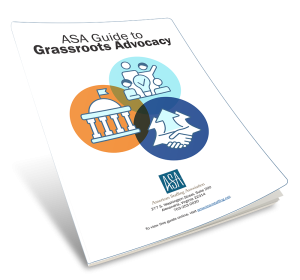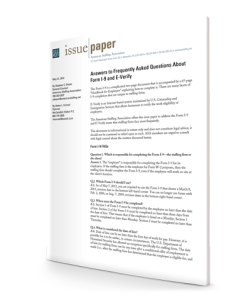Sabrina Swanson is a human resource manager for L.V. Staff Solutions Inc., a small staffing firm specializing in administrative placements. During lunch one day, Swanson’s colleague Elena Elliott, a recruiter for the firm, mentions that a client keeps rejecting applicants for a position the firm is trying to fill. The basis for the rejections is that the applicants have “slight foreign accents.” Elliott states that the client, a wealth management company, advised her that the successful applicant would work at the main office’s front desk, greeting important customers, and requested that only native-English speakers interview for the position.
Swanson recalls reading an ASA Staffing Today newsletter article about the U.S. Equal Employment Opportunity Commission’s new enforcement guidance on national origin discrimination, and wonders if the client’s requirement is problematic. Searching the ASA website, americanstaffing.net, Swanson easily locates the article and sees that the EEOC’s new guidance replaces the 2002 compliance manual section on the same subject and provides examples of conduct that may violate Title VII of the Civil Rights Act of 1964.
According to the EEOC, 11% of all charges filed in 2015 alleged national origin discrimination. The charges alleged a variety of Title VII violations in connection with national origin, including unlawful failure to hire, termination, language-related issues, and harassment. National origin discrimination often overlaps with other forms of discrimination, such as that based on race or religion.
The revised guidance was finalized after comments from approximately 20 organizations, including ASA, were submitted in response to the proposed enforcement guidance in June 2016. Several of ASA’s comments were adopted, including clarifying language that describes staffing firms’ employer role, and revisions to fact scenarios to explain when a client can be held liable under Title VII (e.g., if it knew or should have known of a staffing firm’s discriminatory conduct).
Swanson navigates to the EEOC website and sees that the guidance first defines and explains “national origin discrimination.” Generally, national origin discrimination means: (1) discrimination on the basis that an individual (or his or her ancestors) is from a particular country or has the physical, cultural, or linguistic characteristics of a particular national origin group; or (2) using an employment policy or practice that disproportionately impacts people on the basis of national origin and is not shown to be job related and consistent with business necessity. Title VII prohibits employer actions that have the purpose or effect of discriminating against employees because of their real, or perceived, national origin.
The guidance focuses on three main categories of national origin discrimination in the workplace:
Employment Decisions (including recruitment, hiring, promotion, and adverse employment decisions such as discipline, demotion, and termination). Employment decisions with the purpose of discriminating based on national origin or disproportionately limiting employment opportunities based on national origin violate Title VII, unless the practice or decision is job related and based on business necessity. This is a high bar in the eyes of the EEOC, and requires showing detailed, fact-specific, and credible evidence. Employers may not use customer preference or corporate image as a basis for discriminatory employment decisions. Recruitment and hiring practices should not just rely on “word of mouth” referrals, as such method may reinforce the existing racial or ethnic makeup of the workplace, and staffing firms should attempt to recruit from diverse sources in order to attract a diverse applicant pool. Finally, adverse employment actions must be based on nondiscriminatory reasons such as quality of work, rather than national origin or any other protected category.
Harassment (including hostile work environment and employer liability). Examples of national origin discrimination harassment include: ethnic slurs, intimidation, workplace graffiti, physical violence, or any other offensive conduct directed toward an individual based on his or her birthplace, ethnicity, culture, language, dress, or foreign accent. Employers can be liable for unlawful harassment by supervisors, and even nonsupervisory employees in certain circumstances, so it is important to train staff on the procedures for reporting harassment and handling complaints. Employers should translate policies and procedures, and offer training, in the language(s) spoken by employees.
Workplace Issues Related to Different Languages (including accent discrimination, fluency requirements, and English-only rules). As long as an employee can communicate in English effectively, employers may not discriminate against him or her because of an accent, unless the accent materially interferes with job performance. An employer may not base an employment decision on an accent unless the ability to communicate in spoken English is required to perform job duties effectively and the individual’s accent materially interferes with that job performance. A language fluency requirement is lawful only if fluency is required for the effective performance of the position for which it is imposed. Finally, English-only policies that require employees to speak English at all times in the workplace are presumed unlawful, but tailored restrictive-language policies that are applicable only at certain times or places are not unlawful if needed to promote safe and efficient job performance or business operations. (For example, a hospital may adopt an English-only policy for housekeepers cleaning operating rooms where medical staff only speak English because clear and concise communication between medical staff and cleaning staff in operating rooms is paramount to patients’ health and safety.) Finally, because linguistics are closely associated with national origin, employers should carefully evaluate employment decisions that are based on applicants’ language skills.
Swanson notes that staffing firms are specifically addressed in the guidance, and that staffing firms must be aware that they cannot comply with a client’s request to refer only applicants who are of a particular national origin group. Similarly, staffing firms may not comply with discriminatory recruitment or referral requests from clients. The guidance also makes clear that staffing firms may face liability as a “joint employer” if both the staffing firm and the client have the right to control the worker’s employment. In those circumstances, if a staffing firm learns that one of its employees was subjected to national origin discrimination, it will be liable if it fails to take prompt corrective action within its control.
The EEOC also issued two short, user-friendly resources to accompany the guidance—a Q&A publication and a small business fact sheet that highlights its major points.
Swanson shares her findings with Elliott, advising her that the client’s preference for applicants with no accent may be discriminatory and that L.V. Staff Solutions cannot justify employment discrimination based on the client’s preference. After their conversation, Elliott advises the client that its policy of refusing applicants that have an accent, because there is no real business justification other than corporate image, is potentially unlawful under Title VII. The client agrees to reconsider the applicants previously submitted.
Swanson also takes the opportunity to audit L.V. Staff Solutions’ employment advertisements to ensure they clearly state the staffing firm is an “equal opportunity employer,” and reviews the staffing firm’s employee handbook and employment policies to confirm that each states that harassment based on national origin will not be tolerated and employees who violate the prohibition on harassment will be appropriately disciplined. Because some of the staffing firm’s temporary employees speak Spanish as a primary language, Swanson also researches a company that can translate the firm’s handbook and policies into Spanish because she knows antiharassment procedures and the related complaint process will not be effective if managers and employees are unable to understand them due to language barriers.
Brittany Sakata, Esq., is associate general counsel for the American Staffing Association. Send feedback on this article to s******@americanstaffing.net. Engage with ASA on social media—go to americanstaffing.net/social.
This material is not intended, and should not be relied on, as legal advice. ASA members should consult with their own counsel about the legal matters discussed here.



